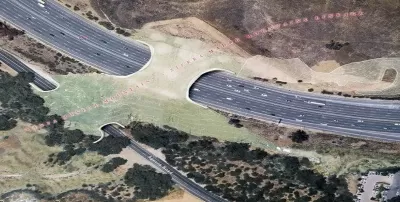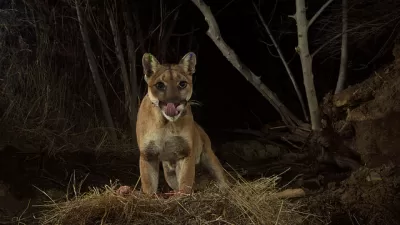The state is budgeting $61 million to build wildlife crossings that increase biodiversity, help species thrive, and save both human and animal lives.

California's wildlife will soon have an easier time crossing busy roads thanks to a new push by state lawmakers to build wildlife crossings, reports Marissa Garcia. In Los Angeles, "[t]he project known as the Liberty Canyon Wildlife Crossing is one step closer to happening now that Gov. Gavin Newsom has signed a budget that includes $7 million to help build it — and another $54.5 million for similar projects in other parts of the state."
The plan is "part of a larger nationwide push to build special bridges and tunnels that help animals safely cross busy roads and freeways. The goal is twofold: to give species at risk the space they need to find mates, and to reduce the number of car crashes that imperil both wildlife and humans." In California alone, at least 7,000 crashes a year involve large wildlife, or roughly 20 such crashes daily. "And they aren’t cheap — for the drivers or the government. Between 2015 and 2018, wildlife crashes have cost more than $1 billion. The expenses include car damage, personal injuries, emergency response, traffic impacts, lost work and the clean-up."
In addition to reducing the carnage, Garcia writes, wildlife crossings would also re-link critical habitats and increase genetic diversity among animals living on both sides of dangerous roadways. When complete, the Liberty Canyon Wildlife Crossing, specifically designed to increase mobility for Southern California's mountain lion population, "will be the largest wildlife passage in the world."
FULL STORY: California is betting $61 million that new highway crossings will keep wildlife safe

Alabama: Trump Terminates Settlements for Black Communities Harmed By Raw Sewage
Trump deemed the landmark civil rights agreement “illegal DEI and environmental justice policy.”

Study: Maui’s Plan to Convert Vacation Rentals to Long-Term Housing Could Cause Nearly $1 Billion Economic Loss
The plan would reduce visitor accommodation by 25% resulting in 1,900 jobs lost.

Planetizen Federal Action Tracker
A weekly monitor of how Trump’s orders and actions are impacting planners and planning in America.

Waymo Gets Permission to Map SF’s Market Street
If allowed to operate on the traffic-restricted street, Waymo’s autonomous taxis would have a leg up over ride-hailing competitors — and counter the city’s efforts to grow bike and pedestrian on the thoroughfare.

Parklet Symposium Highlights the Success of Shared Spaces
Parklets got a boost during the Covid-19 pandemic, when the concept was translated to outdoor dining programs that offered restaurants a lifeline during the shutdown.

Federal Homelessness Agency Places Entire Staff on Leave
The U.S. Interagency Council on Homelessness is the only federal agency dedicated to preventing and ending homelessness.
Urban Design for Planners 1: Software Tools
This six-course series explores essential urban design concepts using open source software and equips planners with the tools they need to participate fully in the urban design process.
Planning for Universal Design
Learn the tools for implementing Universal Design in planning regulations.
Caltrans
Smith Gee Studio
Institute for Housing and Urban Development Studies (IHS)
City of Grandview
Harvard GSD Executive Education
Toledo-Lucas County Plan Commissions
Salt Lake City
NYU Wagner Graduate School of Public Service




























